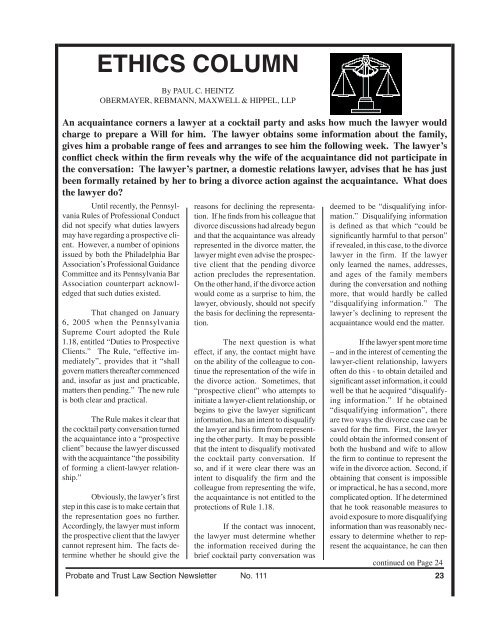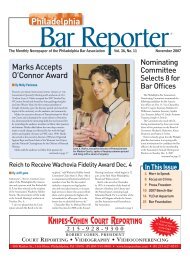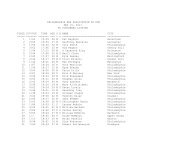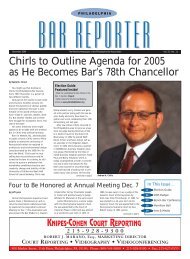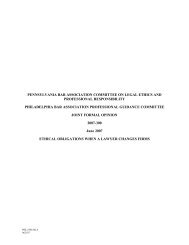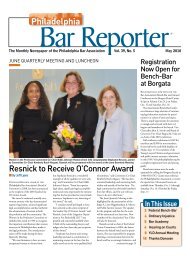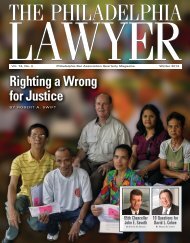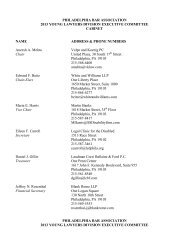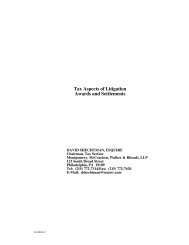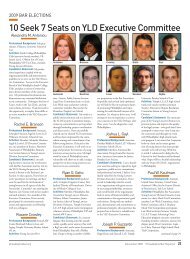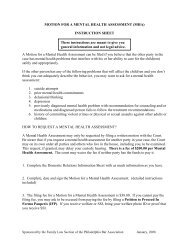Probate & Trust Newsletter: April 2005 - Philadelphia Bar Association
Probate & Trust Newsletter: April 2005 - Philadelphia Bar Association
Probate & Trust Newsletter: April 2005 - Philadelphia Bar Association
You also want an ePaper? Increase the reach of your titles
YUMPU automatically turns print PDFs into web optimized ePapers that Google loves.
ETHICS COLUMN<br />
By PAUL C. HEINTZ<br />
OBERMAYER, REBMANN, MAXWELL & HIPPEL, LLP<br />
An acquaintance corners a lawyer at a cocktail party and asks how much the lawyer would<br />
charge to prepare a Will for him. The lawyer obtains some information about the family,<br />
gives him a probable range of fees and arranges to see him the following week. The lawyerʼs<br />
conflict check within the firm reveals why the wife of the acquaintance did not participate in<br />
the conversation: The lawyerʼs partner, a domestic relations lawyer, advises that he has just<br />
been formally retained by her to bring a divorce action against the acquaintance. What does<br />
the lawyer do?<br />
Until recently, the Pennsylvania<br />
Rules of Professional Conduct<br />
did not specify what duties lawyers<br />
may have regarding a prospective client.<br />
However, a number of opinions<br />
issued by both the <strong>Philadelphia</strong> <strong>Bar</strong><br />
<strong>Association</strong>ʼs Professional Guidance<br />
Committee and its Pennsylvania <strong>Bar</strong><br />
<strong>Association</strong> counterpart acknowledged<br />
that such duties existed.<br />
That changed on January<br />
6, <strong>2005</strong> when the Pennsylvania<br />
Supreme Court adopted the Rule<br />
1.18, entitled “Duties to Prospective<br />
Clients.” The Rule, “effective immediately”,<br />
provides that it “shall<br />
govern matters thereafter commenced<br />
and, insofar as just and practicable,<br />
matters then pending.” The new rule<br />
is both clear and practical.<br />
The Rule makes it clear that<br />
the cocktail party conversation turned<br />
the acquaintance into a “prospective<br />
client” because the lawyer discussed<br />
with the acquaintance “the possibility<br />
of forming a client-lawyer relationship.”<br />
Obviously, the lawyerʼs first<br />
step in this case is to make certain that<br />
the representation goes no further.<br />
Accordingly, the lawyer must inform<br />
the prospective client that the lawyer<br />
cannot represent him. The facts determine<br />
whether he should give the<br />
reasons for declining the representation.<br />
If he finds from his colleague that<br />
divorce discussions had already begun<br />
and that the acquaintance was already<br />
represented in the divorce matter, the<br />
lawyer might even advise the prospective<br />
client that the pending divorce<br />
action precludes the representation.<br />
On the other hand, if the divorce action<br />
would come as a surprise to him, the<br />
lawyer, obviously, should not specify<br />
the basis for declining the representation.<br />
The next question is what<br />
effect, if any, the contact might have<br />
on the ability of the colleague to continue<br />
the representation of the wife in<br />
the divorce action. Sometimes, that<br />
“prospective client” who attempts to<br />
initiate a lawyer-client relationship, or<br />
begins to give the lawyer significant<br />
information, has an intent to disqualify<br />
the lawyer and his firm from representing<br />
the other party. It may be possible<br />
that the intent to disqualify motivated<br />
the cocktail party conversation. If<br />
so, and if it were clear there was an<br />
intent to disqualify the firm and the<br />
colleague from representing the wife,<br />
the acquaintance is not entitled to the<br />
protections of Rule 1.18.<br />
If the contact was innocent,<br />
the lawyer must determine whether<br />
the information received during the<br />
brief cocktail party conversation was<br />
deemed to be “disqualifying information.”<br />
Disqualifying information<br />
is defined as that which “could be<br />
significantly harmful to that person”<br />
if revealed, in this case, to the divorce<br />
lawyer in the firm. If the lawyer<br />
only learned the names, addresses,<br />
and ages of the family members<br />
during the conversation and nothing<br />
more, that would hardly be called<br />
“disqualifying information.” The<br />
lawyerʼs declining to represent the<br />
acquaintance would end the matter.<br />
If the lawyer spent more time<br />
– and in the interest of cementing the<br />
lawyer-client relationship, lawyers<br />
often do this - to obtain detailed and<br />
significant asset information, it could<br />
well be that he acquired “disqualifying<br />
information.” If he obtained<br />
“disqualifying information”, there<br />
are two ways the divorce case can be<br />
saved for the firm. First, the lawyer<br />
could obtain the informed consent of<br />
both the husband and wife to allow<br />
the firm to continue to represent the<br />
wife in the divorce action. Second, if<br />
obtaining that consent is impossible<br />
or impractical, he has a second, more<br />
complicated option. If he determined<br />
that he took reasonable measures to<br />
avoid exposure to more disqualifying<br />
information than was reasonably necessary<br />
to determine whether to represent<br />
the acquaintance, he can then<br />
continued on Page 24<br />
<strong>Probate</strong> and <strong>Trust</strong> Law Section <strong>Newsletter</strong> No. 111 23


